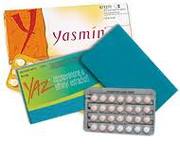Source: FDA final report Combined Hormonal Contraceptives (CHCs) and the Risk of Cardiovascular Disease Endpoints (10/2011); Associated Press; NPR Health News
 The FDA has now released their report on Combined Homonal Contraceptives (CHCs), such as Yaz, and the increased risk of blood clots in women. The study followed more than 800,000 U.S. women taking different forms of birth control between 2001 and 2007. On average, women taking Yaz had a 75 percent greater chance of experiencing a blood clot than women taking older birth control drugs.
The FDA has now released their report on Combined Homonal Contraceptives (CHCs), such as Yaz, and the increased risk of blood clots in women. The study followed more than 800,000 U.S. women taking different forms of birth control between 2001 and 2007. On average, women taking Yaz had a 75 percent greater chance of experiencing a blood clot than women taking older birth control drugs.
From the report directly, “There has long been concern about the risk of both arterial and venous cardiovascular complications imparted by the use of combined hormonal contraceptives (CHCs) in large part because of the prothrombotic effects of estrogen (ethinyl estradiol [EE]). An increased risk of venous thromboembolism [VTE] (deep venous thrombosis [DVT] and pulmonary embolism [PE]) is well established and has been consistently reported”
The FDA concludes that, “[T]he study results add to the small body of literature which shows that the NGMN (norelgestromin/ethinyl estradiol) transdermal patch is associated with higher risk of VTEs relative to standard CHC pills and provides another positive finding to the increasing body of evidence linking DRSP to increased risk of VTE relative to standard low-dose CHC (combined hormonal contraceptive) pills. DRSP was associated with higher risk of ATE in new users overall with this finding restricted to women in the 35-55 years age group only. The finding of increased risk of VTE with the ETON (etonogestrel/ethinyl estradiol ) vaginal ring relative to standard CHCs is new and raises concern but needs to be replicated in other studies.”
The main findings of this study are that all use of the DRSP pill and each of the continuous exposure preparations, the NGMN patch and the ETON vaginal ring, are associated with an increased risk of VTE relative to the standard low-dose OCPs.
Combined hormonal contraceptives are marketed under the following brands and doses:
| Drospirenone and ethinyl estradiol | Drospirenone 3 mg and ethinyl estradiol 0.03 mg |
| Ocella | Drospirenone 3 mg and ethinyl estradiol 0.03 mg |
| Safyral | Drospirenone 3 mg, ethinyl estradiol 0.03 mg, and levomefolate calcium 0.451 mg |
| Syeda | Drospirenone 3 mg and ethinyl estradiol 0.03 mg |
| Yasmin | Drospirenone 3 mg and ethinyl estradiol 0.03 mg |
| Zarah | Drospirenone 3 mg and ethinyl estradiol 0.03 mg |
| Beyaz | Drospirenone 3 mg, ethinyl estradiol 0.02 mg and levomefolate calcium 0.451 mg |
| Drospirenone and ethinyl estradiol | Drospirenone 3 mg and ethinyl estradiol 0.02 mg |
| Gianvi | Drospirenone 3 mg and ethinyl estradiol 0.02 mg |
| Loryna | Drospirenone 3 mg and ethinyl estradiol 0.02 mg |
| Yaz | Drospirenone 3 mg and ethinyl estradiol 0.02 mg |
Yaz contains estrogen along with a next-generation synthetic hormone called drospirenone, which is known to increase potassium levels in the blood. FDA compared medical records of women taking the drug with those taking the older drug levonorgestrel. Yaz, Yasmin and related drospirenone-containing pills were Bayer’s second-best-selling franchise last year at $1.6 billion in global sales. The FDA reports also highlight complications in women using the Ortho Evra patch from Johnson & Johnson and the Nuvaring vaginal ring from Merck & Co. Inc. Those drugs combine estrogen, which is present in all birth control pills, with two other synthetic hormones launched in the last decade
The FDA has recommended that: “Patients should talk to their healthcare professional about their risk for blood clots before deciding which birth control pill to use. Known risk factors that increase the risk of a blood clot include smoking, being overweight (obesity), and family history of blood clots, in addition to other factors that contraindicate use of birth control pills” and that “Women currently taking a drospirenone-containing birth control pill should be informed of the potential risk for blood clots.”
“At a certain point we have to ask why the FDA continues to approve drugs that are less safe and have no benefit compared to drugs already on the market,” said Dr. Diana Zuckerman, president of the National Center for Women and Families, a consumer group for women’s health issues. “With all these different birth control options, why take the most expensive one that can also kill you?” Good question, Dr. Zuckerman. Let’s hope that we finally get anwers.
Posted by: Gayle R. Lewis, Esquire
